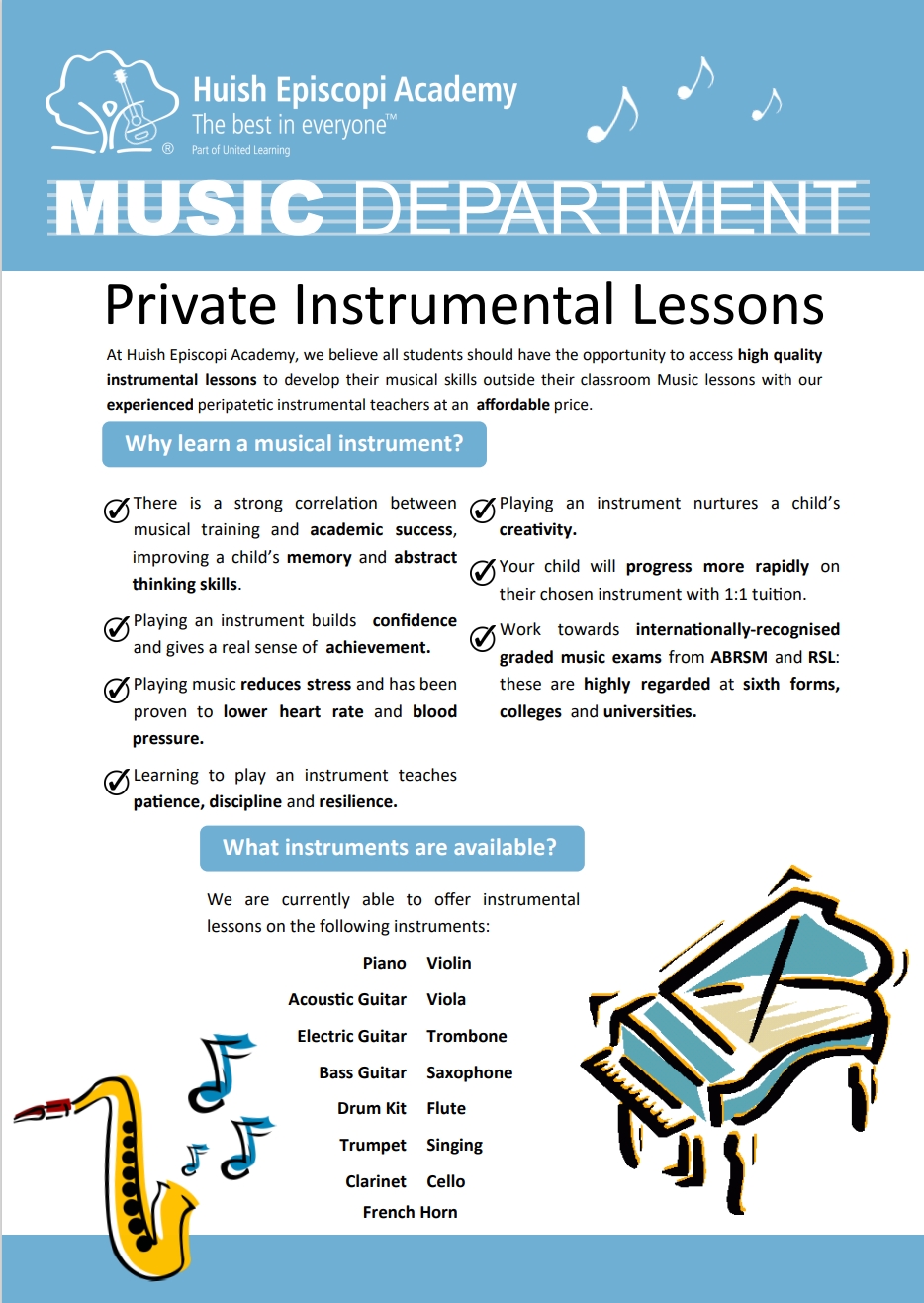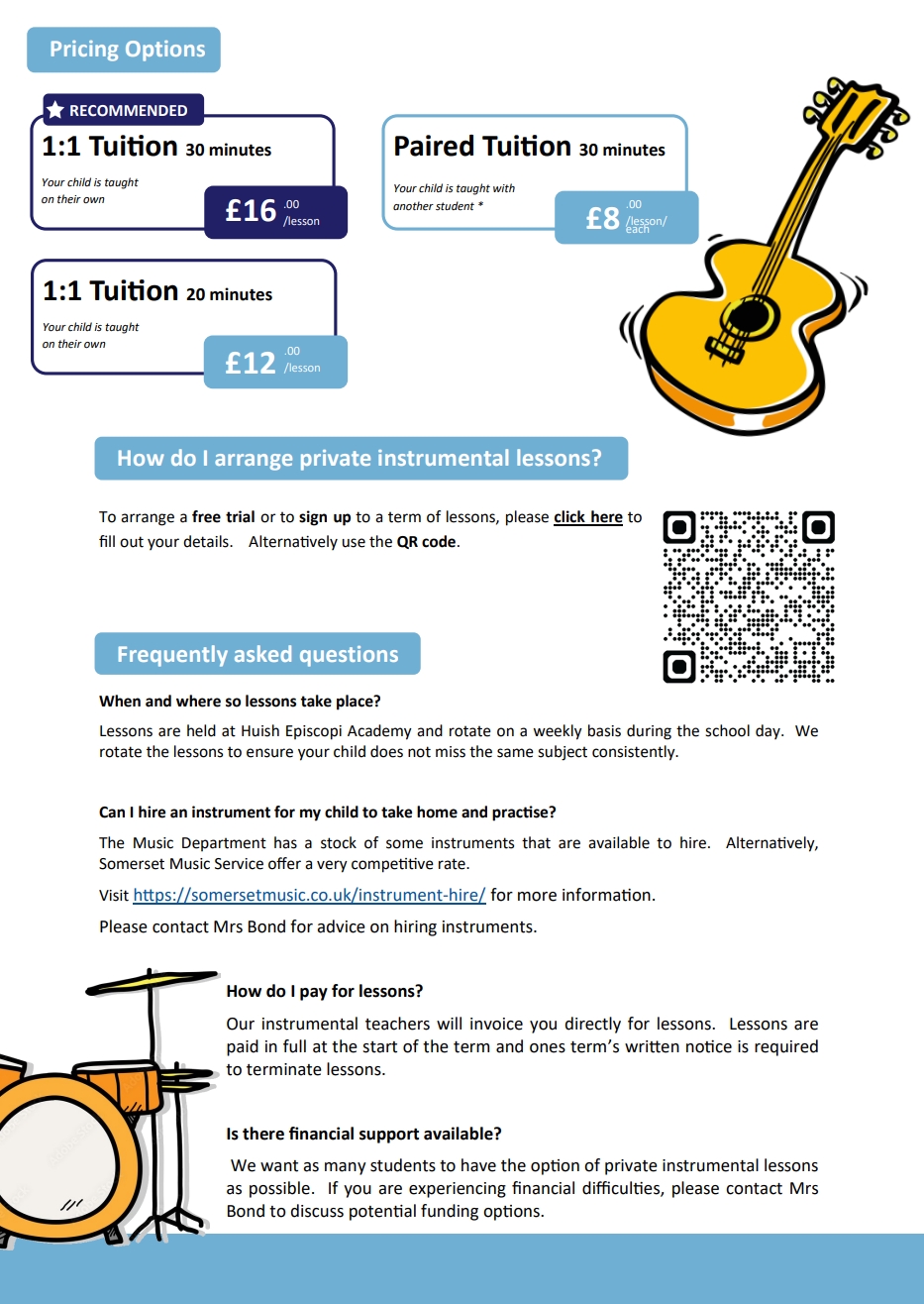Our Vision for Music at HEA
Our music curriculum provides an inclusive and inspiring environment where all students, regardless of background or experience, develop a lifelong love of music. Through a well-sequenced curriculum and enriching opportunities beyond the classroom, students will explore and appreciate music from diverse contexts and cultures.
We foster creativity by offering expressive outlets that empower students to develop their musical identity, while maintaining high expectations in the language of music. Every student will have the opportunity to learn a musical instrument and be encouraged to explore music beyond the classroom through both internal and external experiences.
Technology is seamlessly integrated to enhance learning, and our curriculum embodies the school’s core values of ambition, resilience, and respect. Through these principles, we inspire curiosity, nurture talent, and equip students with the skills and confidence to engage with music in meaningful ways throughout their lives.
Curriculum Overview
Year 7
| Year 7 | |
| Autumn 1 |
Rhythm and Pulse Through Samba, students will develop their rhythmic skills by performing as a whole class ensemble. Students will gain an understanding of how to write rhythms accurately using notation. |
| Autumn 2 |
Singing and the Elements Students will learn to sing using the correct technique and perform confidently as members of a class singing group. Students will explore key musical elements and apply their understanding to a range of listening activities and musical contexts. |
| Spring 1 |
Pitch and Melody Students will learn to confidently read treble clef notation and perform pieces on the keyboard using the correct technique. |
| Spring 2 | |
| Summer 1 |
Hooks and Riffs Students will learn about hooks and riffs from popular songs and learn how to play these on the keyboard. Students will learn to confidently read bass clef and learn to play the piano using both hands. |
| Summer 2 |
Mood Music Introduction to DAW and explore how music can be used to enhance and represent actions. Students will continue to explore the musical elements to reflect physical actions and tell the story. |
Year 8
| Year 8 | |
| Autumn 1 |
Tonality and Structure Students will learn the key vocabulary related to tonality and structure whilst studying two set pieces: In the Hall of the Mountain King by Grieg and New World Symphony by Dvorak. Students will refine and develop their keyboard skills by continuing to play the piano using both hands. |
| Autumn 2 | |
| Spring 1 |
Ensemble Musician Students work creatively developing original ensemble performances. Students learn about major, minor chords and their construction, the primary chords, root position and inversion and harmonic rhythm. |
| Spring 2 | |
| Summer 1 |
Creative Musician Students will learn all about Blues and Jazz – explore features like the 12-bar blues, swing rhythms and improvisation by performing and creating Blues and Jazz music. |
| Summer 2 | |
Year 9
| Year 9 | |
| Autumn 1 |
Composing for Film Students will learn how music can be used to enhance mood, characters and narrative within film. They will study key musical features and compositional techniques used in film scoring. Students will compose their own music to match a film scene using a DAW. |
| Autumn 2 | |
| Spring 1 |
What Makes A Good Song? Students will learn the different components to construct a song. They will learn about primary and secondary chords, creating a chord sequence using instruments, writing a hook and riff, and developing their understanding of structure and texture. |
| Spring 2 | |
| Summer 1 |
Dance Music Students will learn about how music relates to time and context. |
| Summer 2 | |
Year 10
| Year 10 | |
| Autumn 1 |
Step up to GCSE A variety of performance, composition and listening and appraising tasks to bridge the gap between Ket Stage 3 and GCSE. Focus on general music theory, the elements of music, and aural skills. |
| Autumn 2 |
AoS1 - Forms and Devices Students will focus on three periods from the Western Classical Era; Baroque, Classical and Romantic. Within this, they will explore the role of the orchestra, recognising structures, and understanding compositional devices. Exploration will be a balance of aural and theoretical exercises and practical performance or composing tasks. |
| Spring 1 |
AoS1 – Forms and Devices Ongoing work to ensure key terms and vocabulary are regularly recalled. Begin Set Work – Bach, Badinerie. AoS 2 – Music for Ensemble Students will focus on instrumental and vocal ensembles across three main areas – Jazz and Blues, Chamber Music and Musical Theatre. Exploration will be a balance of aural and theory exercises and practical performance or composing tasks. |
| Spring 2 |
AoS1 and 2 Ongoing work to ensure key terms and vocabulary are regularly recalled. Continue Set Work – Bach, Badinerie. AoS 4 – Popular Music Students explore the key features of a range of Popular Music styles. Exploration will be a balance of aural and theory exercises and practical performance or composing tasks. |
| Summer 1 |
AoS 4 – Popular Music Ongoing work to ensure key terms and vocabulary are regularly recalled. Begin Set work: Toto, Africa. AoS 3 – Film Music Students explore the use of musical elements and instrumental techniques used by film composers. Exploration will be a balance of aural and theory exercises and practical performance or composing tasks. |
| Summer 2 |
Continue Set Work – Toto, Africa. Revisit all areas of study in preparation for end of year assessment. NEA Coursework Expectations and initial starting points for September when the Free Composition is started. |
Year 11
| Year 11 | |
| Autumn 1 |
NEA Coursework Free composition is started; students decide their own brief and create the composition using DAW software or recording live instruments / voices. NEA Coursework Solo and Ensemble Performance repertoire agreed upon (with support from peripatetic staff). Listening and Appraising Revisiting Bach Badinerie and Toto Africa set works. Ongoing listening and appraising practice in preparation for Autumn mock. |
| Autumn 2 |
NEA Coursework Free composition continues and is handed in by Christmas. This includes recording, score or annotations, and a completed composing log. NEA Coursework Solo and Ensemble Performance repertoire practiced. Listening and Appraising Revisiting Areas of Study as required. Ongoing listening and appraising practice in preparation for Autumn mock. |
| Spring 1 |
NEA Coursework Brief composition is started; students have a choice of 4 briefs which are linked to the areas of study and create the composition using DAW software or recording live instruments / voices. NEA Coursework Solo and Ensemble Performance repertoire practiced, ready to be recorded after half term. Listening and Appraising Revisiting Areas of Study as required. Ongoing listening and appraising practice in preparation for Spring mock. |
| Spring 2 |
NEA Coursework Brief composition is continued and handed in by Easter. This includes recording, score or annotations, and a completed composing log. NEA Coursework Solo and Ensemble Performances recorded. Exam Preparation Past Papers and Key Vocabulary Brief Composition completed. |
| Summer 1 |
Exam Preparation Past Papers and Key Vocabulary. All NEA coursework marked and submitted for external moderation. |
| Summer 2 | Listening and Appraising Paper – early June. |
Year 12
| Year 12 | |
| Autumn 1 |
AoS D Jazz – Introduction and overview Students explore the jazz precursors, including Blues and Ragtime. AoS E – Into the 20th Century Introduction to Impressionism and related composers Ravel and Debussy. |
| Autumn 2 |
AoS D - Jazz Students explore early jazz styles and artists, including New Orleans Jazz, Dixieland and Piano Styles. AoS E – Into the 20th Century Expressionism and Serialism and related composers Webern, Berg and Shoenberg. |
| Spring 1 |
AoS D - Jazz Students explore Big Band and Swing. AoS E - Into the 20th Century Neo-classicism and related composers Prokofiev, Stravinsky and Poulenc. |
| Spring 2 |
AoS D - Jazz Students explore Bebop and Cool Jazz. AoS E - Into the 20th Century Set Work: Poulenc’s Trio for Oboe, Bassoon and Piano. |
| Summer 1 |
AoS D - Jazz Revisit the styles and exam style questions. AoS E - Into the 20th Century Set Work: Debussy’s Nuages from Three Nocturnes |
| Summer 2 | Revision and preparation for end of year exam. |
Year 13
| Year 13 | |
| Autumn 1 |
AoS D - Jazz Revisit the styles in more depth. AoS E – Into the 20th Century Revisit Impressionism and Debussy Set Work. |
| Autumn 2 |
AoS D - Jazz Revisit the styles in more depth. AoS E – Into the 20th Century Revisit Neo-Classicism and Poulenc Set Work. |
| Spring 1 |
AoS D - Jazz Revisit the styles in more depth. AoS E – Into the 20th Century Revisit wider listening genres. |
| Spring 2 | Revision and Past Paper Practice. |
| Summer 1 | Revision and Past Paper Practice. |
| Summer 2 | Listening and Appraising Paper. |
Assessment
| Autumn Term | Spring Term | Summer Term | |
| Year 7 |
Group Singing Performance Rhythm Composition |
Keyboard Performance | Mood Music Composition |
| Year 8 | Theme and Variation Composition | Ensemble Performance | Blues and Jazz Performance |
| Year 9 | Film Composition | Band Ensemble Performance | |
| Year 10 |
Prepared Performance General listening and aural tasks Composing Task |
Prepared Performance Exam style questions Composing tasks |
End of Year Exam – Listening and Appraising Paper |
| Year 11 |
Free Composition Mock Exam 1 |
Brief Composition Solo and Ensemble Performance recordings Mock Exam 2 |
Listening and Appraising Paper |
| Year 12 |
Prepared Performance Exam style questions Composition Tasks |
Prepared Performance Exam style questions Composition Tasks |
Prepared Performance End of Year Exam – Listening and Appraising |
| Year 13 |
Prepared Performance Mock Exam 1 |
Mock Exam 2 Performance recital (External Examiner) |
Listening and Appraising Paper Composition Submission |
Exam Board Link(s)
KS4
Eduqas GCSE Music: GCSE Music | Eduqas
BTEC Tech Award in Music Practice: Music Practice (2022) | BTEC Tech Awards | Pearson qualifications
KS5
Eduqas A Level Music: AS and A Level Music | Eduqas
Extracurricular Opportunities
- Year 7 Singers
- 8+ Voices
- Orchestra
- Karaoke Club
- String Group
- Flute Group


Careers
Where can Music qualifications take you?
- Performer: singer, instrumentalist, or DJ
- Composer
- Conductor/Musical Dirtector
- Productions: Audio Engineer/Sound Engineer/Music Producer
- Music teacher or therapist
Learning Beyond the Curriculum
- Usborne 100 Things to Know about Music
- Big Bangs by Howard Goodall
- Musical Truth by Jeffrey Boakye
- Good Vibrations by Mark Cunningham
- A Year of Wonder: Classical Music for Every Day by Clemency Burton-Hill
- 50 Rappers Who Changed the World by Candace McDuffie
- Young Person’s Guide to Vocal Health by Olivia Sparkhall
- History of Rock for Big Fans and Little Punks by Rita Nabais
- Ukulele for Teens by Alli Johnson & Chad Johnson
- The Story of Now That’s What I Call Music in 100 Artists by Michael Mulligan



